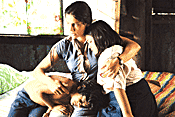Throughout the 1970s and '80s, El Salvador was awash in violence, as a succession of ineffectual military governments, aided by even more virulently right-wing "death squads" -- bankrolled not by the government, but by the civilian oligarchy -- took on leftist guerrillas who were pushing for agrarian reform. The dispute started as a local affair, but the stakes were raised immeasurably and tragically when both the U.S. government and Fidel Castro became involved. The U.S. sent military advisors and weapons to the government, while Cuba -- and the Soviet Union -- backed the rebels, also with arms and men. More than 75,000 Salvadorans died or disappeared as a direct result of the fighting.
One of the more horrifying details of the conflict is that the military and, to a lesser extent, the rebels forcibly conscripted children into their ranks. Soldiers would swoop into villages and round up boys aged 12 and older, marching them off at gunpoint. Those who resisted were shot.
Innocent Voices, in Spanish with English subtitles, focuses on 11-year-old Chava (Carlos Padilla Leñero), who lives in a shantytown with his mother, Kella (Leonor Varela), and two younger siblings. Although a typical fun-loving kid, he takes his role as man of the house very seriously. As fighting in the area increases and Chava's 12th birthday approaches, life becomes even more perilous -- and Kella becomes more determined than ever to protect her son.
Alternately heartrending and buoyant, painful and sweetly humorous, the film does a wonderful job of capturing how war must feel to children. Terrified when gun battles erupt, they quickly forget their fears when the danger subsides, returning to their normal kid lives.
A great deal of the film's success is attributable to Leñero, an expressive, incredibly likable kid, who seems completely at ease in front of the camera (as do all the children). Despite all the fear, sorrow, and tragedy that fills young Chava's life, he never seems to lose his innate exuberance. Shyly courting a classmate; roughhousing with friends; racing down the street, pretending to drive a bus -- he has an irrepressible spirit that proves infectious. Varela and Ofelia Medina, as Chava's grandmother, also give fine performances.
The story also touches upon the activist role taken by the Catholic Church during this period. Daniel Giménez Cacho is stirring as the village priest who can no longer remain silent in the face of government atrocities. It should be noted that, while Torres and director Luis Mandoki's own political leanings are obvious, they also acknowledge the culpability of the rebels in putting the lives of villagers at risk. And it's clear that Kella and the other mothers don't care which side a bullet comes from, if their child is the victim. For the villagers, the war is a case of survival, pure and simple.
Films that deal with the effect of war on children's lives are relatively rare. Obvious antecedents include Rene Clement's disquieting Forbidden Games (with one of the most emotionally devastating final shots in film history), Keisuke Kinoshita's extraordinary Twenty-Four Eyes, and John Boorman's delightful Hope and Glory, all of which deal with World War II. The first two examples may be about children, but they are definitely geared for adult audiences, while Boorman's comically nostalgic take on London during the Blitz is also kid-friendly.
Innocent Voices combines the energy and high spirits of this last film with the heartrending tragedy of the first two. Innocent Voices is far more uplifting, undoubtedly in part because we know that Chava/Oscar survived. After all, he grew up to write this movie.
Mandoki, who spent the 1990s directing a string of romantic dramas, including White Palace, When a Man Loves a Woman, and Message in a Bottle, hasn't made a film this good since 1987's Gaby, which dealt with the relationship between a middle-aged woman with cerebral palsy and her young caretaker. That film, too, was based on a true story and radiated verisimilitude.
Although Innocent Voices is set in a specific time and place, it is sadly universal in what it depicts. El Salvador is only one of 40 nations in which children as young as 12 are kidnapped and forced to fight. Worldwide, it is estimated that more than 300,000 children currently serve in their nations' militaries. It is a horrifying statistic.










